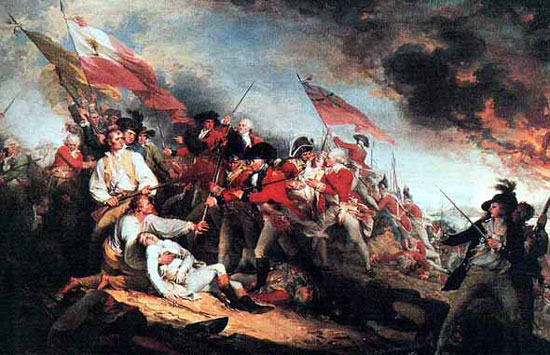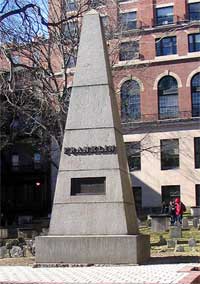

Temple's Diary
A Tale of Benjamin Franklin's Family
In the Days Leading up to The American Revolution
And so it has happened, a real bloody battle, not a skirmish like Lexington and Concord, but something that will go down in history, I guess, as the Battle of Bunker Hill. It took place, as usual, in Massachusetts. That is where the revolution, if there is to be a revolution, is brewing — around Boston.

"The Battle of Bunker Hill" by John Trumbull.
We only heard about it today because New Jersey does not have a single newspaper! One has to wait for news to come from Philadelphia. We heard about the battle just as I was about to be formally introduced to high society at a party given by Father and his wife for their wealthy friends. A tea party, I should remark, even though tea, imported from England, is forbidden these days in the Colonies.
So there I was, decked out in my new clothes, well washed, well combed, somewhat excited at the prospect of this new step up the social ladder. Father introduced me as "my son Temple who has been educated in London and is now about to pursue his studies at King's College in New York." The mention of King's College surprised me. Grandfather had once referred to it as a hotbed of Tories and has always talked of the College of Philadelphia for me, but I kept my peace and concentrated on bowing to the ladies and shaking the men's hands, looking them in the eye as I did, and standing tall. I wanted my new parents to be proud of me.
As soon as we had settled down, Father said he had an announcement to make. He looked very grave as he explained that a battle between about 2,500 British regulars and about 1,500 Massachusetts volunteers had taken place on June 17. The British commander in Boston, General Gage, had received in late May the reinforcements he had requested from London, many of them veterans from the French and Indian War. He decided to send some of his fresh troops to the north of Boston, specifically to the end of a peninsula on which rise both Bunker Hill and Breeds Hill. Gage understood that Bunker Hill was of strategic importance to the colonists who are busy organizing their forces just four miles away, in Cambridge.
When the Rebels became aware of the British general's intention, they decided to frustrate it. Under cover of darkness during the night of June 16, they managed to send their men and a few field guns to the top of Bunker Hill. The surprised British woke up to find American guns pointing down at them. General Gage felt he had to capture the hill no matter what it might cost and ordered a frontal attack, supported by artillery, by the guns of his ships, and by floating batteries on both sides of the peninsula.
Since the Bostonians had a limited supply of powder and used unreliable old muskets, their leader, General William Prescott, told them, "Don't one of you fire until you see the whites of their eyes." And so they did. Waiting until just before being overrun, the Rebels delivered a fire so deadly that the British troops retreated in disorder. Soon a second wave marched up the steep hill, only to be repulsed again.
By the end of the day, however, a third wave — fighting with bayonets — managed to capture the hill, and thus the British finally commanded the whole peninsula.
As Father reached that point in his account, the roomful of tea drinkers broke into wild cheers: "Jolly good show!...Those Rebels got what they deserved... That'll teach those hotheads...They must know their place now." When the hubbub calmed down, my father continued: "The casualties are high. More than 1,000 killed and wounded on the British side, more than 400 for the Rebels. And the nearby town of Charlestown almost totally destroyed by fire on the order of General Gage."

This memorial to Franklin's parents was erected by the citizens of Boston in 1827 to replace the original slab put up by Franklin in 1754. It is in the Old Granary Burying Ground, Boston.
My father's voice almost broke at that point and his face was all pain. The Franklin family is rooted in Boston, after all, even if Benjamin chose to run off to Philadelphia. Most of Grandfather's relatives, including his sister Jane, still live there. His parents are buried there, under the tombstone Grandfather erected with their names and those of his brothers and sisters who had already died. What is about to happen to that aged aunt, the cousins, their children, their homes?
While my father's face was all pain, his guests were still boisterous. "What a victory," they kept repeating, "what a wonderful victory!" "Say something, Father," I silently begged. "Tell them to stop gloating. Shut them up. Assert yourself. You are the Governor." But Father, looking both sad and perplexed, kept silent.
All of a sudden, I heard my own English voice piping up: "Still," said my voice, "you must admit that it took some courage to stand there and do nothing while being fired at from all sides. Don't you think that the Rebels, even though they lost at the end, must feel more self-confident than before? Once they are trained and have proper weapons..."
There was dead silence in the room. They were all glaring at me, eyes narrowed with anger, lips pursed in disgust. Who does he think he is, that boy? And who is he, anyway?
I avoided my father's gaze and looked down at my shoes, my highly polished, fine new shoes.
